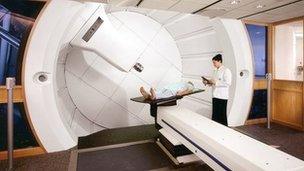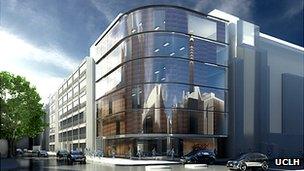Proton beam therapy centres to be based in Manchester and London
- Published

The treatment is already carried out in the US and Switzerland
A £250m project to build "cutting-edge" radiotherapy centres in Manchester and London by 2017 has been confirmed.
The plan will see University College London Hospital (UCLH) and The Christie offer proton beam therapy, which uses a particle beam to destroy cancer cells.
Health Secretary Andrew Lansley said the centres would be a "vital" addition to the UK's cancer facilities.
Earlier plans to also include University Hospitals Birmingham in the project were dropped in December.
Currently, NHS patients in the UK needing the therapy have to travel to Switzerland or America for treatment.
Dr Ed Smith, of the Christie, said the treatment was particularly effective because it targeted the cancer precisely.
"With X-rays, when you are treating a patient, they can go through the tumour and affect the normal tissues," he said.
"With proton beam therapy, you can stop the beam in the tumour itself, so you're sparing much more of the normal tissue."
'Significant difference'
Experts said the therapy had been found to be particularly suitable for use against complex childhood cancers and adult brain, neck and head cancers.
UCLH's chief executive Sir Robert Naylor said the new facilities would make a "significant difference to the lives of hundreds of patients every year, particularly children and teenagers".

New buildings to house the facilities will be built at both hospitals
"It provides an opportunity for the NHS to become a world leader in paediatric radiotherapy, and gain an international profile in many complex adult cancers," he said.
Mr Lansley said that about 1,500 patients a year could benefit from the new facilities, which he said would be "unparalleled".
"Developing a national proton beam therapy service is vital to ensuring our cancer facilities are world class," he said.
The Department of Health (DfH) announced in October 2010 that three hospitals were to be considered as host hospitals for the new centres.
The government said University Hospitals Birmingham had now been identified as a third potential site - but only if demand increased.
A spokesman for the DfH said UK-based proton beam therapy facilities would reduce the cost of sending patients abroad, which was expected to cost £30m a year by 2014.
- Published13 December 2011
- Published12 December 2011
- Published11 October 2010